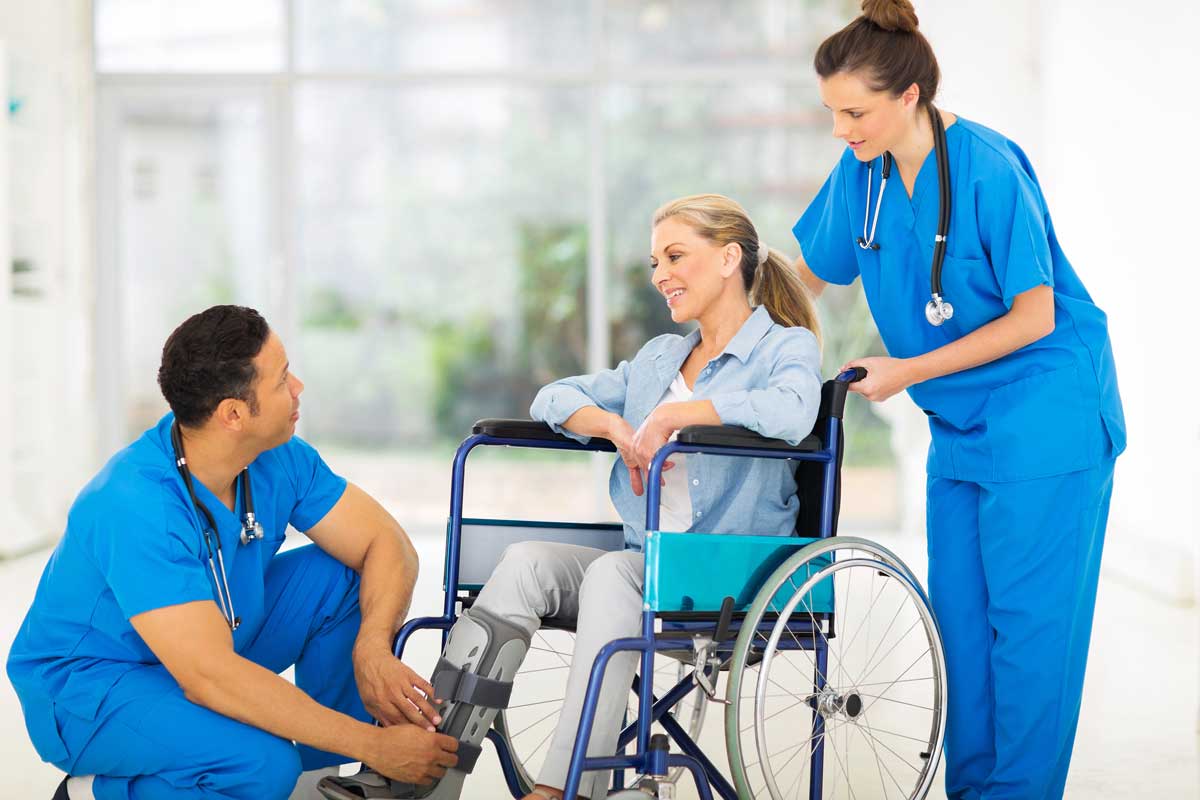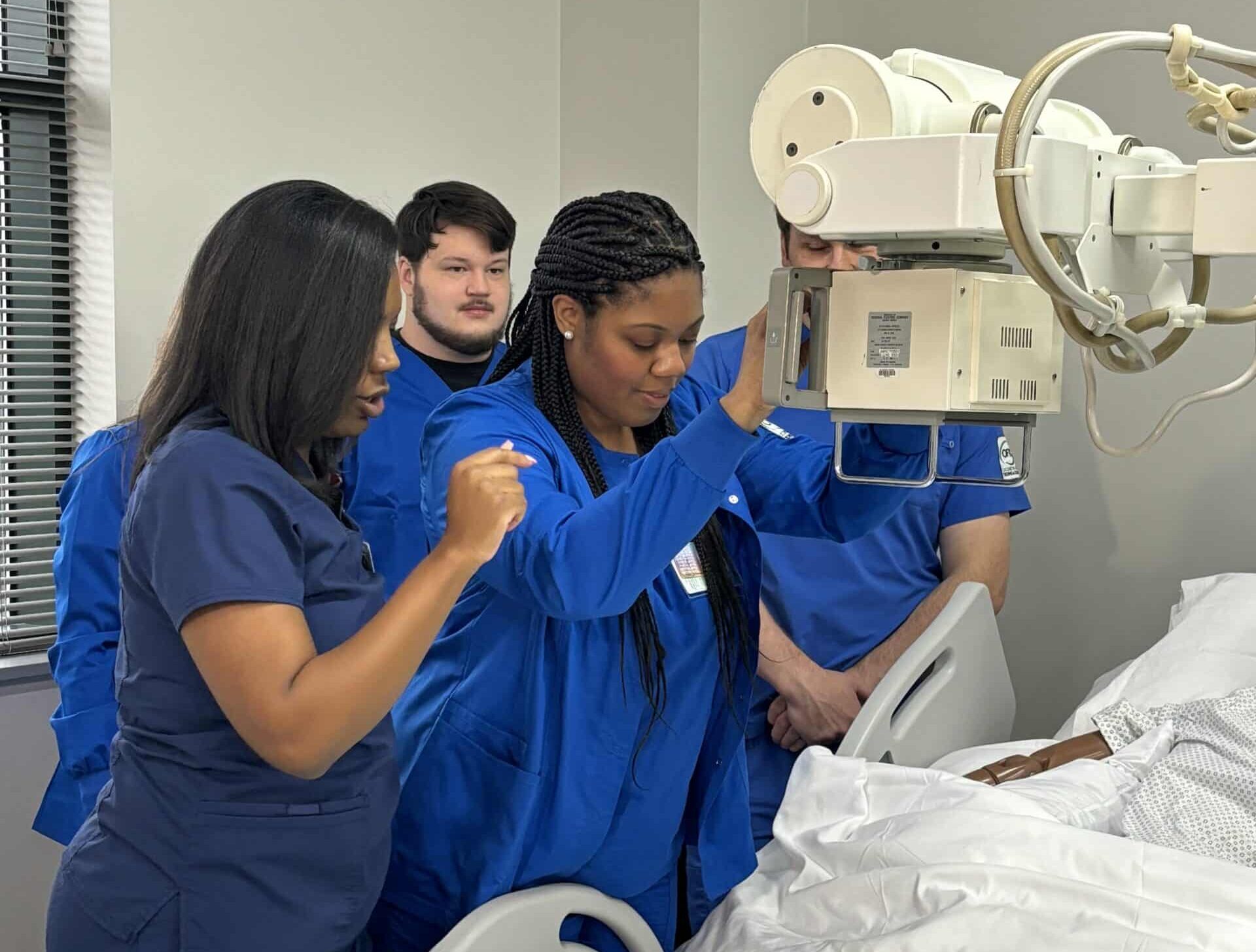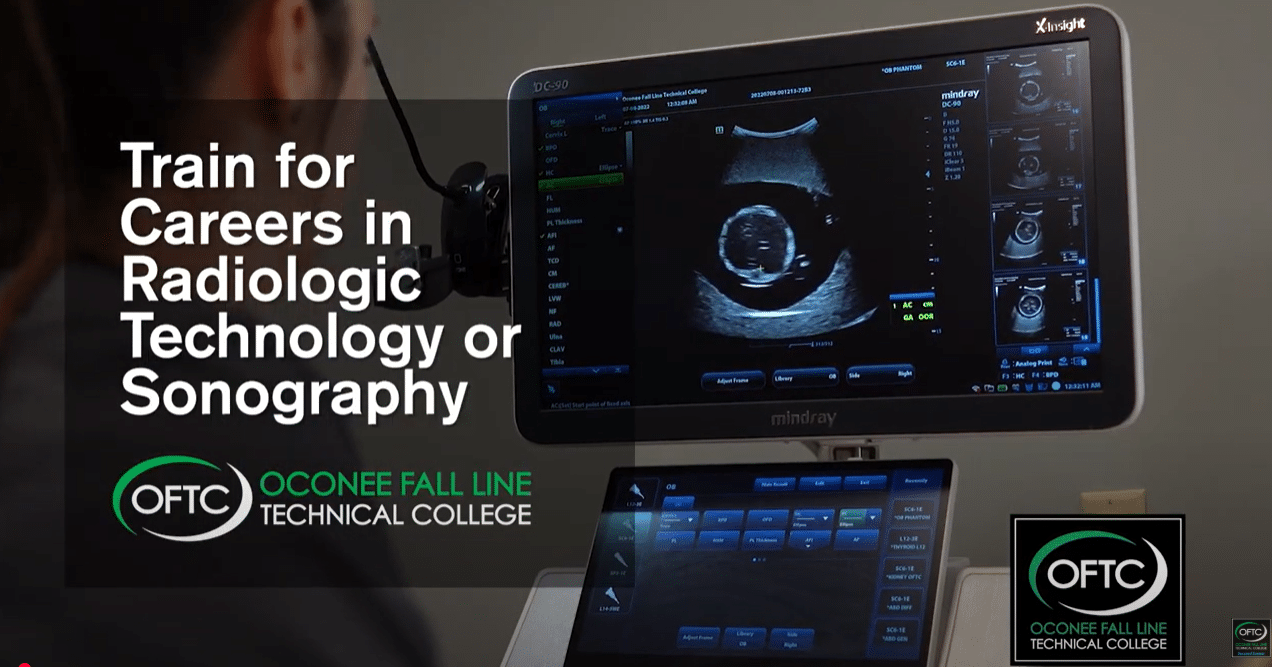Radiologic Technology
settingsRadiologic technologists make up the third-largest group of health care professionals—surpassed in number only by physicians and nurses. Rad Techs create images of patients’ bodies using medical equipment to help doctors diagnose and treat diseases and injuries.
Overview
The Imaging Science programs at OFTC provide a strong foundation for launching a successful career in Radiologic Technology. Graduates are prepared to pursue additional certifications that open doors to advanced career opportunities. Upon completing the program, students are eligible to apply for certification exams through the American Registry of Radiologic Technologists (ARRT) in the specialty areas covered by their training.
Radiology departments employ a variety of advanced imaging equipment including:
- X-ray machines
- CT (CAT) scanners
- MRI machines
- Ultrasound devices
- Nuclear medicine cameras
This program primarily trains students to perform diagnostic imaging using x-ray machines. Training for other advanced imaging modalities, such as CT or MRI, typically requires further education or on-the-job experience. The diversity of technology and skills in radiologic technology keeps the field dynamic and engaging.
Accreditation
The Radiologic Technology program is accredited by the Joint Review Committee on Education in Radiologic Technology (JRCERT).
20 North Wacker Drive, Suite 2850
Chicago, IL 60606-3182
Phone: (312) 704-5300
Email: mail@jrcert.org
The program’s current award status is 5 years, with the next accreditation site visit scheduled for April 2026. View the general program accreditation information and the current accreditation award letter.
Program Length
Programs in the Radiologic Technology department can be completed in 2 to 4 semesters.
Programs

Imaging Science Assistant Technical Certificate of Credit
Radiologic Technology
Certificate of Credit
3 Semesters
The Imaging Science Assistant technical certificate of credit program will prepare students for positions in imaging departments and related industry as a tech aide, transporter, or radiology office assistant. The imaging specialization area includes an introduction to radiography, and a lab component.

Radiologic Technology Associate of Applied Science Degree
Radiologic Technology
Associate of Applied Science Degree
6 Semesters
The Radiologic Technology associate of applied science degree program is a sequence of courses that prepares students for positions in radiology departments and related businesses and industries. Program graduates will have satisfied the didactic and clinical education requirements set forth by the American Registry of Radiologic Technologists and may apply for ARRT certification and registration upon meeting the ethics requirements of the profession.
The HOPE Career Grant is available to HOPE Grant-qualified students who enroll in select majors specifically aligned with industries in which there are more jobs available in Georgia than there are skilled workers to fill them. Learn More
Features
Job Stability & Security
Employers look for the skills you need to do your job in addition to soft skills like flexibility, reliability, and working independently. Because technologists encounter all sorts of patients, they need to have a compassionate communication style so that they can communicate effectively with anyone who crosses their lab or table.
Little or No Cost to You
With the Pell Grant, Georgia’s HOPE Grant, HOPE Scholarship, and HOPE Career Grant (for students/programs who qualify) and other scholarship opportunities, many students graduate OFTC with little to no debt.
Tuition & Fees
With tuition at $107 per credit hour, total costs for Radiologic Technology department programs range from:
- Tuition & Fees*: $2,762.00 – $9,024.00
- Books & Supplies*: $2,550.00
*Visit the OFTC Catalog to view each individual program and its full breakdown of tuition, fees, books, and supplies. Costs are estimated and are subject to change.
Advancement Opportunities
A radiologic technologist can choose to further specialize in areas like Magnetic Resonance Imaging, Computed Tomography, radiation therapy, nuclear medicine, mammography, and more.
Locations
Oconee Fall Line Technical College has campuses throughout its 11-county service area. We look forward to your visit.
Online
Admissions
Our application process takes just a few minutes to complete, but we want to make sure you have the things you’ll need on hand to complete the application. We’re here to help if you have any questions!
Admissions Process
Your admissions application can be submitted online with your $25.00 non-refundable application fee and takes just a few minutes to complete.
- Submit a completed application and application fee.
- Submit official high school transcript, GED transcript, or official college transcripts, if applicable.
- Submit official entrance score on a validated assessment instrument, if applicable. Visit the OFTC Catalog Program Page to view each individual program and its required minimum scores.
- Complete the FAFSA (Free Application for Federal Student Aid) and HOPE applications online using OFTC School Code: 031555.
NOTE: The College may accept transfer credit for other courses according to the College’s transfer policy.
General Requirements
Be at least 16 years of age.
Additional admissions requirements unique to each program are listed on each individual program page in the OFTC Catalog.
Competitive Admissions
This program is competitive. To be eligible to apply, students must attend a required information session either during the term of or the term before the selection deadline.
Need More Info?
For more information about any of these programs, contact a program advisor:
Dublin Program Advisor
For additional information on admission to OFTC, contact the Office of Admissions:
Sandersville Office of Admissions
Dublin Office of Admissions
Learning Format
Students may begin core courses any semester and compete to enter the Pharmacy Technology programs each fall semester.
Classes are offered in a variety of formats: on campus, blended, online asynchronous, and synchronous technology.
On Campus
These are courses that are taught primarily in the classroom or lab with less than 50% of instruction online. On campus courses may include lecture, labs, internships, clinicals, and other in-person instructional modalities.
Blended
Blended courses are distance learning courses with the majority of the course content, activities, and interactions occurring online but may require students to come to campus for specific assignments, activities, or events.
Online Asynchronous
These are courses that are taught fully online asynchronously with course content, activities, and interactions occurring entirely online. This delivery method does not require students to be online at a specific date or time, and students may participate in class activities and complete course assignments asynchronously. Online asynchronous courses require proctored events.
Synchronous Technology
OFTC also utilizes synchronous technology to offer courses via distance education means. The course is taught on one campus and then broadcast simultaneously to a classroom on a different campus that is monitored by a class proctor.
Flexible Schedule
We want you to get the most out of college and understand the pressure it adds to your life. At OFTC you can achieve your career goals and fit college into your lifestyle. We offer small class sizes and flexible scheduling.
Courses for our programs are offered during the morning, afternoon, and evenings – plus many are online where you can do your work any time of day.
And the personalized hands-on attention you receive in a small classroom setting allows you to get individualized support, focus and feedback from your instructors. Your instructors will get to know you and help you build the foundation and confidence needed for success in your field.
Apply TodayPaying for College
At OFTC, we realize that many students require financial assistance to achieve their academic goals. We’ll work with you to help you obtain financial aid to assist you in funding your education. We’re committed to helping you find ways to pay for this life-changing investment.
With the Pell Grant, Georgia’s HOPE Grant, HOPE Scholarship, and HOPE Career Grant (for students/programs who qualify) and other scholarship opportunities, many students graduate OFTC with little to no debt.
Financial Aid
OFTC offers several financial aid opportunities that can help you pay for college. Most students apply for federal and state aid, including the Pell Grant, HOPE Scholarship & Grant, and HOPE Career Grant.
OFTC students can also apply for scholarships through the OFTC Foundation and various businesses and civic-sponsored organizations.
Contact the Office of Financial Aid or visit OFTC’s Financial Aid web page to learn more about grants, scholarships and Federal Work Study to help fund your education.
Sandersville
Dublin
Georgia awarded over $934 million in scholarships in AY24
of OFTC students have some form of Scholarship in AY24
OFTC students received over $6.6 million in financial assistance in FY25
More than 75% of OFTC students received some sort of Financial Aid in AY24
Contact
Sandersville
Dublin
Tuition & Fees
With tuition at $107 per credit hour, total costs for Radiologic Technology department programs range from:
- Tuition & Fees*: $2,762.00 – $9,024.00
- Books & Supplies*: $2,550.00
*Visit the OFTC Catalog to view each individual program and its full breakdown of tuition, fees, books, and supplies. Costs are estimated and are subject to change.
New Price Calculator
You can also use the Net Price Calculator to get estimated net price information based on what similar students paid in a previous year.
Career Outlook
Graduates of the Radiologic Technology program are ready for in-demand roles in hospitals, private clinics, doctors’ offices, and other healthcare settings. These positions offer hands-on experience, career growth, and the chance to play a vital role in patient care.
BLS.GOV
Radiologic & MRI Technologists (Associate’s Degree)
- 2024 Median Annual Pay: $78,980
- Job Outlook: 6% through 2033
What does this mean to you?
Completing this program prepares you to become a Certified Radiologic Technologist, a vital role in healthcare. Radiologic technology is essential for diagnosing illnesses and conditions, making this a growing, in-demand field with strong salaries and career stability.
Learn More

job placement rate for OFTC graduates within the graduation year (AY23)
in-field job placement rate for OFTC graduates within the graduation year (AY23)
of OFTC students enrolled are First Generation college students (AY24)
Program Benefits
Skills Learned
- Adjust and maintain imaging equipment
- Follow precise orders from physicians on what areas of the body to image
- Prepare patients for procedures, including taking a medical history and shielding exposed areas that do not need to be imaged
- Position the patient and the equipment in order to get the correct image
- Operate the computerized equipment to take the images
- Work with physicians to evaluate the images and to determine whether additional images need to be taken
- Keep detailed patient records
Job Titles
- Radiologic technologist
- Magnetic resonance imaging (MRI) technologists
Diverse Settings
- Hospitals
- Offices of physicians
- Medical and diagnostic laboratories
- Outpatient care centers

"OFTC is a great place to study for a career in Radiology. I'm a graduate of their program's first-ever radiology cohort. OFTC is committed to making sure their students are the best they can be. The college has a good relationship with the clinical sites and that truly makes a difference; it provides students and graduates with a team of people surrounding them to ensure they succeed."
